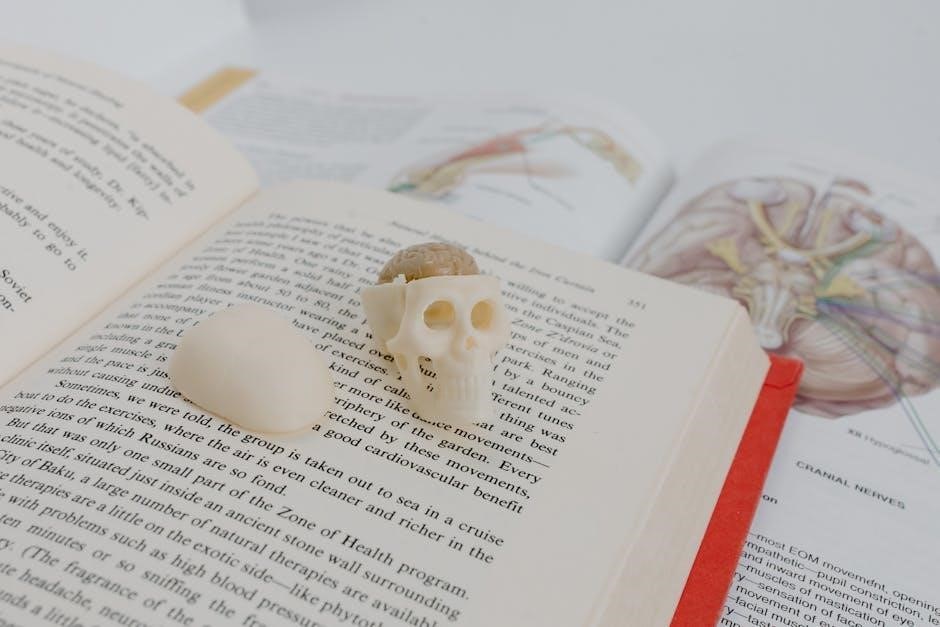Personality theories explore the complexities of human behavior and thought, offering insights into why individuals differ․ Funder’s The Personality Puzzle provides a comprehensive overview, blending classic theories with modern research to understanding personality development and traits․
Overview of Personality Theories
The study of personality theories encompasses various approaches, including biological, psychoanalytic, humanistic, and trait-based perspectives․ Funder’s The Personality Puzzle provides a comprehensive framework, integrating classic theories with contemporary research․ It explores how these theories explain individual differences, behaviors, and thought patterns, offering a holistic understanding of personality development and its complexities across different psychological paradigms․
Importance of Studying Personality Theories
Studying personality theories is essential for understanding human behavior and individual differences․ Funder’s The Personality Puzzle highlights how these theories provide frameworks for explaining motivations, emotions, and cognitive processes․ By examining diverse perspectives, students gain insights into psychological assessment, therapy, and personal development․ This knowledge enhances empathy, self-awareness, and practical applications in fields like psychology, education, and counseling, making it a vital area of study․

Biological Perspective
The biological perspective examines the role of genetics, brain structure, and neuroscience in shaping personality․ Funder’s work highlights how these factors influence traits and behaviors, linking biology to psychological processes․
Role of Genetics and Neuroscience
Genetics and neuroscience play a crucial role in shaping personality, as highlighted in Funder’s work․ Research reveals that genetic factors significantly influence personality traits, while neuroscience explores how brain structures and neurotransmitters contribute to behavior and emotional responses․ Advances in neuroimaging and genetic studies provide deeper insights into the biological underpinnings of personality, linking heritable traits to specific neurological processes․
Evolutionary Theory and Personality
Evolutionary theory explains personality as shaped by natural selection, with traits like extraversion and conscientiousness emerging to enhance survival and reproduction․ Funder’s work highlights how evolutionary principles provide a framework for understanding universal personality traits, offering insights into why certain behaviors persist across cultures․ This perspective bridges biology and psychology, illustrating how adaptive mechanisms influence personality development and behavior patterns․

Psychoanalytic Theories
Psychoanalytic theories, founded by Freud, explore the unconscious mind’s role in shaping behavior․ Funder’s textbook discusses how Adler and Jung expanded on Freud’s ideas, emphasizing individual striving and psychological types, respectively․ These theories remain foundational in understanding personality dynamics and human motivation․
Freud’s Psychoanalytic Theory
Sigmund Freud’s psychoanalytic theory posits that personality arises from unconscious conflicts and childhood experiences․ He proposed the structure of personality as the id, ego, and superego, emphasizing the role of repression and defense mechanisms․ Freud’s theory also introduces the Oedipus complex and the process of transference, shaping therapeutic practices․ His work laid the groundwork for understanding the unconscious mind’s influence on behavior, as discussed in Funder’s comprehensive overview of personality theories․
Adler and Jung: Divergence from Freud
Alfred Adler and Carl Jung diverged from Freud, focusing on different aspects of personality․ Adler emphasized social interests and the inferiority complex, while Jung introduced the collective unconscious and archetypes․ Both theorists expanded beyond Freud’s psychosexual stages, offering unique perspectives on human motivation and development․ Their work laid the foundation for modern personality theories, highlighting the diversity of psychological thought as explored in Funder’s comprehensive textbook․

Humanistic Approach
The humanistic approach emphasizes personal growth, self-actualization, and inherent human potential․ Carl Rogers and Abraham Maslow pioneered this perspective, focusing on self-determination and fulfillment․ Funder’s textbook explores their theories, highlighting the importance of self-concept and individual uniqueness in shaping personality․
Carl Rogers and Self-Actualization
Carl Rogers’ humanistic theory centers on self-actualization, the innate drive to realize one’s potential․ He emphasized empathy, congruence, and unconditional positive regard in fostering personal growth․ Funder’s The Personality Puzzle highlights Rogers’ belief that individuals naturally strive toward self-fulfillment when provided a supportive environment, making his approach foundational in counseling and personality development․
Abraham Maslow and the Hierarchy of Needs
Abraham Maslow’s Hierarchy of Needs proposes that human behavior is driven by the fulfillment of sequential needs, from basic physiological requirements to self-actualization․ Funder’s The Personality Puzzle highlights how Maslow’s theory emphasizes personal growth and potential, with self-actualization representing the pinnacle of psychological health․ This approach underscores the humanistic belief in innate goodness and the pursuit of meaningful life experiences․

Behavioral and Social-Cognitive Theories
Behavioral theories focus on observable actions, with Skinner’s operant conditioning emphasizing rewards and punishments․ Social-cognitive theories, led by Bandura, highlight observation and imitation in shaping behavior, as detailed in Funder’s The Personality Puzzle․
Skinner and Operant Conditioning
B․F․ Skinner’s operant conditioning theory explains behavior as shaped by consequences like rewards or punishments․ Positive reinforcement increases desired behaviors, while negative reinforcement removes unpleasant stimuli․ Skinner argued that personality arises from learned behaviors, emphasizing environmental influences over innate traits․ His work, as discussed in Funder’s The Personality Puzzle, highlights how external factors shape individual behavior and personality development․
Bandura and the Role of Observation
Albert Bandura’s social cognitive theory emphasizes observation and imitation in shaping behavior․ He proposed that individuals learn by observing others, a process called modeling․ Bandura’s famous Bobo doll experiment demonstrated how aggressive behaviors can be acquired through observation․ His theory highlights the reciprocal interaction between personal factors, behavior, and the environment, stressing the role of cognitive processes in personality development․ Observation is a key mechanism for learning and adapting behaviors in social contexts․

Trait Theories
Trait theories focus on identifying and classifying stable personality characteristics․ The Big Five Model, a widely accepted framework, categorizes traits into openness, conscientiousness, extraversion, agreeableness, and neuroticism․
The Big Five Model
The Big Five Model, also known as the Five Factor Model, categorizes personality into five broad dimensions: openness, conscientiousness, extraversion, agreeableness, and neuroticism․ These traits are seen as stable across time and situations, providing a framework for understanding individual differences․ Research supports the universality of these traits, making the model widely used in personality assessment and psychological studies․ Its simplicity and empirical backing contribute to its popularity in modern psychology․
Modern Research on Trait Theories
Modern research on trait theories, as discussed in Funder’s The Personality Puzzle, highlights the Big Five Model’s enduring relevance․ Advances in neuroimaging and machine learning have deepened understanding of trait stability and biological underpinnings․ Contemporary studies also explore how traits interact with social and cultural contexts, expanding the scope of trait theories beyond traditional frameworks․ This integration of classic models with cutting-edge methods continues to refine personality psychology․

Cognitive Theories
Cognitive theories focus on mental processes shaping personality․ Funder’s The Personality Puzzle explores cognitive-behavioral approaches, emphasizing thought patterns and beliefs․ Key figures include Beck and Ellis, whose models link cognition to behavior, offering therapeutic insights․
Cognitive-Behavioral Theory
Cognitive-behavioral theory examines how thoughts influence behaviors and emotions․ According to Funder’s The Personality Puzzle, this approach emphasizes the role of cognitive distortions and maladaptive patterns․ By addressing these, individuals can change harmful behaviors, making it a cornerstone of many therapeutic interventions․ The theory bridges the gap between cognitive processes and observable actions, offering practical applications in psychology․
Beck and Ellis: Cognitive Approaches
Beck and Ellis are pioneers in cognitive approaches to personality․ Beck’s cognitive theory focuses on identifying and challenging negative thought patterns, while Ellis’s rational emotive behavior therapy emphasizes irrational beliefs․ Both approaches, as discussed in Funder’s The Personality Puzzle, aim to help individuals understand and modify their thought processes to improve emotional and behavioral outcomes, making them foundational in cognitive-behavioral therapy․

Erikson’s Psychosocial Development Theory
Erikson’s theory outlines eight stages of psychosocial development, from trust vs․ mistrust in infancy to integrity vs․ despair in adulthood, shaping personality through conflict resolution․
Stages of Psychosocial Development
Erikson’s theory proposes eight stages of psychosocial development, each marked by a unique conflict․ From infancy’s trust vs․ mistrust to adulthood’s integrity vs․ despair, these stages shape personality․ Success in earlier stages fosters virtues like hope and competence, while failure may lead to negative outcomes․ Each stage builds on the previous, influencing lifelong psychological and social growth, as detailed in Funder’s exploration of Erikson’s work․
Impact of Erikson’s Theory on Modern Psychology
Erikson’s psychosocial theory has profoundly influenced modern psychology, offering a lifespan perspective on development․ His stages provide a framework for understanding identity formation, social roles, and emotional growth․ Funder highlights how Erikson’s work has shaped research in developmental psychology, counseling, and education, emphasizing the importance of early experiences and societal expectations in shaping personality across the lifespan․

Applications of Personality Theories
Personality theories offer practical applications in understanding behavior, guiding therapeutic interventions, and enhancing personal growth․ Funder’s textbook bridges theory with real-world applications, emphasizing their relevance in counseling and education․
Personality Assessment and Testing
Personality assessment tools, like the Big Five Model, provide insights into individual traits․ Funder’s textbook highlights how these assessments integrate psychological theories, offering a comprehensive understanding of behavior․ Modern testing incorporates advanced research methods, ensuring reliability and validity in measuring personality dimensions․ These tools are widely used in clinical, educational, and workplace settings to guide decision-making and personal development, reflecting the practical applications of theoretical frameworks․
Therapeutic Applications of Personality Theories
Personality theories provide frameworks for understanding and addressing mental health issues․ Cognitive-behavioral therapy, rooted in cognitive theories, helps individuals modify thought patterns․ Humanistic approaches, like Rogers’ self-actualization, foster personal growth․ These theories guide therapeutic techniques, enabling psychologists to tailor interventions to individual needs․ By aligning therapy with theoretical insights, practitioners can effectively address anxiety, depression, and other conditions, promoting emotional well-being and resilience․
Personality theories, as explored in Funder’s work, provide essential insights into human behavior, integrating classic and modern research to understand individual differences and psychological processes effectively․
Theories of personality, as outlined in Funder’s work, encompass biological, psychoanalytic, humanistic, cognitive, and trait-based approaches․ These frameworks explore genetics, unconscious motives, self-actualization, and observable traits, providing a holistic understanding of human behavior․ Modern research integrates these theories, offering insights into personality development and psychological processes, as discussed in The Personality Puzzle and other contemporary studies․
Future Directions in Personality Research
Future research in personality psychology will focus on integrating biological and evolutionary perspectives with modern techniques like neuroimaging․ Advances in AI and big data will enable deeper insights into personality traits and dynamics․ Additionally, cross-cultural studies will explore how societal influences shape personality, offering a more global understanding of human behavior and psychological processes․
